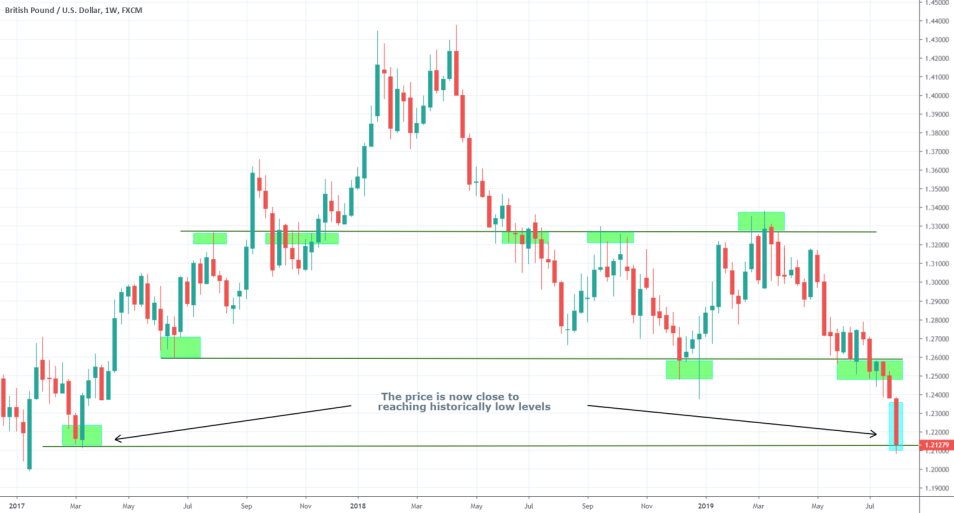In a media statement following yesterday's monetary policy decision, the Bank of England's Monetary Policy Committee (MPC) announced that it had voted unanimously to maintain the interest rate unchanged at the present level of 0.75 per cent. In doing so, the BOE is the first major central bank to abstain from following the recent trend of cutting the interest rates which other influential central banks have already done.
“Since May, global trade tensions have intensified and global activity has remained soft. This has led to a substantial decline in advanced economies’ forward interest rates and a material loosening in financial conditions, including in the United Kingdom.” [source]
The BOE now weighs in on a no-deal Brexit eventuality following the appointment of Boris Jonson as the new MP, and the MPC recognizes the turbulent period yet ahead of Britain, however, it also projects soothed conditions for investment growth after the Brexit uncertainties get eventually resolved.
“GDP is projected to accelerate to robust growth rates, reflecting a gradual recovery in global growth and firming UK domestic demand growth, driven in large part by a recovery in investment growth as uncertainties dissipate in line with the Brexit conditioning assumption.”
Overall, the MPC recognizes the detrimental effects of the stalled Brexit negotiations, which have caused the BOE to lower its expectations for GDP growth to less than 2 per cent over the next year, however, the committee remains somewhat upbeat about the prospects as the general uncertainty from Brexit starts to disappear and the economic conditions become less volatile. The MPC expects a smooth transition process following the resolution of the Brexit uncertainties, which it projects to be marked by ‘a significant margin of excess demand’.
"Were that to occur, the Committee judges that increase in interest rates, at a gradual pace and to a limited extent, would be appropriate to return inflation sustainability to the 2% target."
Overall, BOE’s optimism over the midterm and longterm does not give much in support of the collapsing value of the pound, which is continuously reaching new lows as the possibility of striking a good trade deal becomes less and less plausible, as the final Brexit deadline approaches. The GBPUSD pair is currently trading around a major support level of 1.21150, which was last reached in May of 2017. Given the current market outlook and the reluctance of the BOE to implement any immediate changes to its monetary policy, the currency pair is likely to test the historically low level that was reached immediately after the announcement of the Brexit vote.

Trendsharks Premium
Gold is undergoing a correction, as investors take profits to offset losses from falling stock prices, impacting their margins. However, we anticipate a renewed wave of [...]
The Swiss stock market index is mirroring its global counterparts, such as Germany 40 and US100, experiencing a sharp decline following the announcement of new [...]
We’re analyzing the weekly chart to grasp the broader market trend. Over the past three years, the US30 index has surged by 17,000 points, often resembling a nearly straight [...]
Over the past week, the DAX has experienced a sharp decline, plunging by an astonishing 3,400 points. This downward movement is not isolated, as its international counterparts, such as the UK100 and US100, are also facing significant [...]
EURUSD recently formed a double top at 1.0930, signaling a potential trend reversal, and has since begun a correction. After a 600-pip rally since early March, a pullback at this stage is both expected and healthy. Given these conditions, we are placing a [...]
Since early March, EURJPY has surged nearly 1,000 pips, providing us with several excellent trading opportunities. However, as the rally matures, many early buyers are beginning to take profits, leading to a noticeable slowdown in the uptrend. On Friday, the pair formed a [...]
The AUDJPY currency pair continues to be dominated by bullish momentum, as multiple golden cross patterns reaffirm the strength of the ongoing uptrend. Despite this, we are witnessing a much-needed [...]
The EURAUD currency pair appears to be undergoing a trend reversal, signaling a potential shift in market direction. A notable technical development is the formation of a Death Cross on the chart, a widely recognized bearish indicator that typically suggests a [...]
After securing an impressive 200-pip profit last week, the EURJPY currency pair is now undergoing a southward correction, retracing some of its recent gains. Despite this temporary pullback, the Golden Cross remains intact, reinforcing our view that the overall trend continues to be [...]
The appearance of a Golden Cross in Silver strengthens our analysis that the metal is currently in a strong uptrend, indicating further bullish momentum in the market. This technical pattern, where the short-term moving average crosses above the [...]
This trade presents a considerable level of risk and can be classified as an opportunistic move based on recent price action. The GBPUSD currency pair has experienced a substantial bullish rally, surging by nearly 500 pips in a strong upward movement. However, after this extended period of appreciation, the pair is showing signs of a potential [...]
The anticipated Death Cross on the SMI20 appears to be failing as price finds strong support at the 23% Fibonacci retracement level. After testing this area, the index has shown bullish strength, printing several large green candles, signaling an increase in [...]
A Golden Cross has just appeared on the USDJPY chart, signaling a potential bullish move. This technical pattern occurs when the 20 period moving average crosses above the 60 period moving average, a widely recognized indication of increasing [...]
After 2 months of a down trend, we finally see some indications of price recovery for Oil. The golden cross, a historic buy signal, supports this [...]
For the past month, the German DAX40 has experienced a remarkable 10% surge, reflecting strong bullish momentum. Despite ongoing market volatility and frequent pullbacks, every dip continues to attract fresh buyers, reinforcing the [...]
Oil continues its downward trajectory, despite occasional pullbacks. The overall trend remains bearish, reinforced by multiple Death Cross patterns, a classic sell signal indicating further weakness. Adding to this bearish outlook, the critical [...]
Over the past few days, gold has experienced a sharp decline of more than $100. This downturn can be attributed in part to traders securing profits to manage their margins, which are under strain due to the significant drop in major indices. Currently, gold has fallen below the [...]
The NASDAQ 100 index is showing strong bullish momentum, as evidenced by the formation of a Golden Cross on the chart. This classic buy signal occurs when the short moving average crosses above the long term moving average, suggesting that upward momentum is [...]
The EURAUD currency pair has encountered a significant resistance level, failing to break above the critical 61% Fibonacci retracement level. This suggests that bullish momentum is weakening, reinforcing the case for a potential downward move. Given this technical setup, we favor entering a [...]
The UK100 is experiencing a remarkable rally! Over the past few weeks, the British stock market index has surged nearly 800 points. Each minor dip has attracted more buyers, fueling the bullish momentum. However, since last week, we’ve observed a slight [...]




















